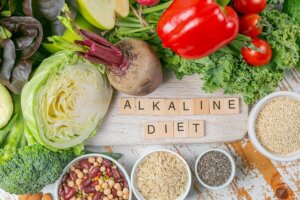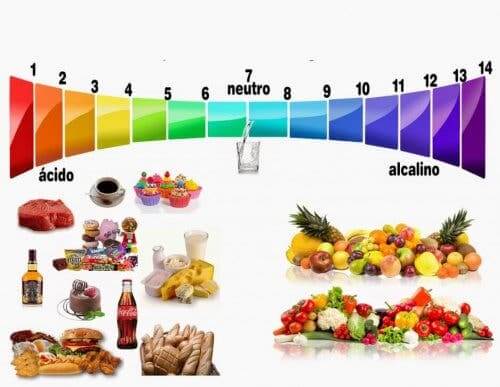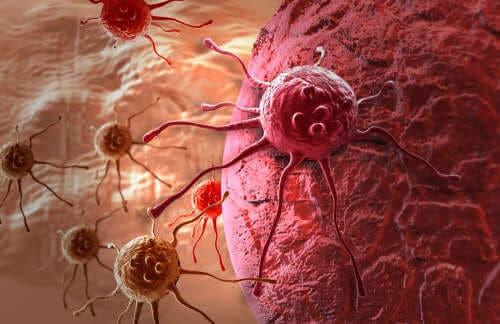The Alkaline Diet: Here's What You Need To Know


Written and verified by the nutritionist Eliana Delgado Villanueva
The alkaline diet has been a real trend lately. But what’s the truth about this diet? Can you trust it?
Controversy over this eating pattern is booming. Some attribute almost magical properties to it, such as being able to cure diseases like cancer. However, the issue isn’t entirely clear. That’s why we’ll explain everything you should know in this article.
What is the alkaline diet?

To understand this diet, you first have to understand how the body’s pH works. The potential for hydrogen is called pH, which is measured on a scale of 0 to 14 and is used to measure the acidity or alkalinity of substance or solution.
- 0 to 7 is acidic.
- 7 is neutral.
- From 7 to 14 is basic or alkaline.
The alkaline diet is based on the theory that diseases develop in an acidic environment (that is, with a low pH) and that, to prevent them, you should “alkalize” your body, or increase its pH . It claims that you can do this through the food you eat.
You might also be interested in: 5 Essential Nutrients for a Healthy Diet
How does the alkaline diet work?
The hypothesis of this diet is that your diet changes the pH of your body fluids. In other words, it changes the acidity or basicity of your blood, urine, and all your body fluids.
As some diet promoting physiologists explain, a slightly alkaline environment could be beneficial to your body. However, the scientific literature confirms that this isn’t possible. An article published in the magazine “Osteoporosis International” states that it is not possible to vary the acid-base balance of the blood – it’s basically unchangeable.
The alkaline diet, therefore, excludes foods such as dairy, meat, poultry, fish, eggs, and grains. Foods that, according to the diet, produce «acid ash». It does allow you to eat fruits and vegetables, except blueberries and plums.
What does science say about this diet?
1. Relationship with cancer

Despite the wide promotion of the alkaline diet, there’s only one observational study that has analyzed its possible relationship to the prevention and treatment of cancer. However, this study finds no relationship between this type of diet and cancer.
Given the lack of studies that support or reject the ideas behind the alkaline diet, we have to conclude that they lack a scientific basis. In this context, the American Institute for Cancer Research (AICR) does not recommend the alkaline diet.
2. Relationship with osteoporosis and bone health
The diet also promises benefits to your bone health. According to the alkaline diet theory, to reduce the acidity of the blood (which, as we have already seen, isn’t possible) the body uses calcium from the bones, so acidic food is related to less calcium and more osteoporosis.
However, in this study published in 2009, they concluded that, although consuming more protein did increase calcium excretion, it didn’t come from the bones, since there were no changes in the overall calcium balance in the body. For this reason, following an acidic diet doesn’t promote lower bone density.
Before you go, be sure to read: The Role of Diet in Menopause Symptoms
The alkaline diet does not improve your health

Your body is extremely efficient at regulating blood pH, as you’d have serious problems if it wasn’t. Therefore, it’s impossible to change your blood pH through the alkaline diet, although you can change your urine pH.
The alkaline diet, although it promotes the consumption of certain beneficial foods like greens and vegetables, has no scientific evidence behind it to support its claims.
Certain food groups in this type of diet also offer many benefits, so you shouldn’t exclude them from your healthy diet.
To finish, you should keep in mind that when faced with this type of miracle diet, you should always remember that if something seems too good to be true, it probably is.
All cited sources were thoroughly reviewed by our team to ensure their quality, reliability, currency, and validity. The bibliography of this article was considered reliable and of academic or scientific accuracy.
- Fenton TR, Fenton CJ. Evidence does not support the alkaline diet. Osteoporos Int. 2016 Jul;27(7):2387-2388. doi: 10.1007/s00198-016-3504-z. Epub 2016 Feb 8. PMID: 26856582.
- Fenton TR, Lyon AW, Eliasziw M, Tough SC, Hanley DA. Meta-analysis of the effect of the acid-ash hypothesis of osteoporosis on calcium balance. J Bone Miner Res. 2009 Nov;24(11):1835-40. doi: 10.1359/jbmr.090515. PMID: 19419322.
- Rodrigues Neto Angéloco L, Arces de Souza GC, Almeida Romão E, Garcia Chiarello P. Alkaline Diet and Metabolic Acidosis: Practical Approaches to the Nutritional Management of Chronic Kidney Disease. J Ren Nutr. 2018 May;28(3):215-220. doi: 10.1053/j.jrn.2017.10.006. Epub 2017 Dec 6. PMID: 29221627.
This text is provided for informational purposes only and does not replace consultation with a professional. If in doubt, consult your specialist.








